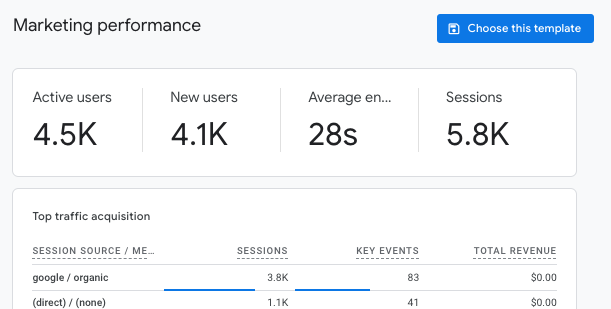Too Much Intelligence, Not Enough Wisdom
I’ve noticed that many of the applications I use on a daily basis have released some form of insights feature, intended to add a layer of intelligence to an application that was previously just a tool. A pertinent example here is Google Analytics, which has started inserting AI generated insights at the top of detail reports. Occasionally these insights are interesting, but mostly I find them a pointless distraction.
An example of a Google Analytics “generated insight”:

This makes me think of the elevators in The Hitchhiker’s Guide to the Galaxy, which became sulky when relegated to merely moving people up and down. I find features like code assistance very useful, but I don’t need every app I open to initiate a conversation. I wonder where it’s all headed. It feels like “intelligence” is becoming commoditized, and the spot price is trending downwards.
What this makes me realize is that wisdom in the context of analytics is going to be much more important going forward. What we are experiencing right now is just the beginning. A few years from now, we are going to be so inundated with insights coming at us from every direction that the ability to recognize what actually matters and filter out what doesn’t could determine who has jobs and who doesn’t.
To close this topic on a practical note, my advice to anyone embarking on an analytics career right now is: yes, go ahead and learn python, but also seek wisdom on the difference between information and knowledge. A good place to start is the work of Jorge Luis Borges. Not for the first time, I am reminded that he was the Nostradamus of our time.
Product Updates
- Looker Studio Query Results Variables – With this new feature you can now insert data directly from your data sources into text. Below is an example, you can see that I was able to insert the name of my most watched video last month plus a few metrics. I don’t use the percent of total metric format very often but this seems like a case where I might use it a lot. A big downside in my opinion is that you can’t insert date comparisons so I can’t do something like say how many views I got this month compared to last month, unless my data source has that as a field. You also can’t pull query results variables from a blend, at least not yet.

- GA4 Reports snapshot templates
‘Reports snapshot’ is the default screen that loads when you open reports in GA4. This is a pretty minor feature update, but it reminded me how customizable reports in GA4 are. In general, I rely on Looker Studio for reporting, because I find the UX easier to work with and more flexible, but the configurability of GA4 reporting is nice. If you do go into GA4 to keep an eye on metrics, I recommend perusing these templates, then customizing the one you choose to show exactly what you care about. If you don’t see the templates, click the pencil icon on your Reports snapshot, scroll down to the bottom of the ‘Customize report’ pane, and click the ‘TEMPLATE’ drop down.

Workflow
- Easy ways to prepare your BigQuery warehouse for AI, MeasureLab
In principle, I’m 100% in favor of adding meaningful field descriptions and tags to tables I create, but in practice I sometimes cut corners. This article highlights a benefit I hadn’t thought of. - Seer Interactive has been sharing a lot of great information about how they are incorporating AI into their workflows. I’m super grateful to them as we work on doing the same at Two Octobers.
- I broke my collarbone a few weeks ago, which has nudged me to figure out how to use voice-to-text wherever I can. One of the things I’ve really been enjoying is voice mode and voice transcription in ChatGPT. Voice transcription in particular has been really helpful for analyzing data. I find that I’m a lot more comfortable iterating back and forth to get to what I need. If your opinion of voice-to-text is based on Siri, you’ll be impressed by how much better ChatGPT is. Google Docs too.
Ideas
- Analytics — the Right Way, a book review by Lukas Oldenburg
The bracketing approach for determining target metrics is really useful, and there is an excerpt towards the bottom pertaining to dashboards that is a little too familiar. I can’t decide yet whether I will buy the book, mostly because my read-to-purchase rate for books like this is well below 50%. But I really like some of what Lukas describes. - An Interactive Map of Global Migration, New York Times
An outstanding interactive data visualization. I had a lot of fun playing with it and it changed my perspective on immigration. Very cool. - Let the Regression to the Mean Do Its Thing, Juliana Jackson
I’m going to take all of Juliana’s articles and use them to build a GPT, so I can get insights like this whenever I want. (Read the article to appreciate the irony. Also because it’s a thoughtful take on how AI is changing how we think.)
Privacy
- Google is now saying that there is no end in sight to third-party cookie support in Chrome. Exactly no one is surprised that the Golden Goose has been rescued from the chopping block.
- Calm Down—Your Phone Isn’t Listening to Your Conversations. It’s Just Tracking Everything You Type, Every App You Use, Every Website You Visit, and Everywhere You Go in the Physical World, McSweeney’s
The next time someone talks nonsense about how your phone is eavesdropping on you, you can pull this out. That’ll show them 😉
Miscellaneous
- Every BI Tool Ever Ranked, Hugo Lu
An apples-to-oranges-to-eggplants comparison listicle, but funny enough to be worth it.
Don’t Miss our Next Analytics Roundup
Sign up for our newsletter to get Nico’s monthly Analytics Roundups delivered to your email box.


